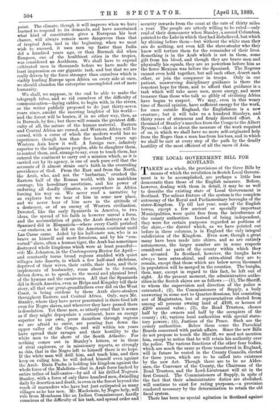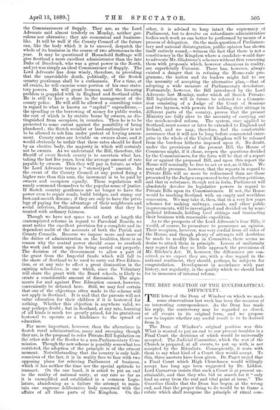THE LOCAL GOVERNMENT BILL FOR SCOTLAND.
TAKEN as a whole, the provisions of the three Bills by means of which the revolution in Scotch Local Govern- ment is to be accomplished, are perhaps a little less democratic than those of the English measure. Before, however, dealing with them in detail, it may be as well to describe the existing state of Local Government in Scotland. The salient feature of the system is the complete autonomy of the Royal and Parliamentary boroughs of the sister-Kingdom. Up till last year, none of the English towns, except a few ancient or specially important Municipalities, were quite free from the interference of the county authorities. Instead of being independent, they were for certain purposes regarded as portions of the shire,—the district which, as we have pointed out before in these columns, is in England the only integral subdivision of the Kingdom. Even now, though a great many have been made into shires, and so are entirely autonomous, the larger number are in some respects considered as parts of the county within which they are situated. In Scotland, however, the burghs have always been extra-shiral, and extra-shiral they are to remain, except that those, which are below seven thousand in population will be merged in the counties. The burghs, then, may, except in regard to this fact, be left out of sight. At the present moment, the administrative autho- rities in the Scotch shires are as follows :—(1), The Sheriff, to whom the supervision and direction of the police is entrusted ; (2), the Commissioners of Supply, a body answering in some sort to Quarter-Sessions, but consisting not of Magistrates, but of representatives elected from among all persons owning land of £100, or houses of £200 annual value ; (3), the Road Trustees, chosen half by the owners and half by the occupiers of the county ; (4), various local authorities with special statu- tory powers ; (5), Justices of the Peace. Such are the county authorities. Below them come the Parochial Boards concerned with parish affairs. Since the new Bills do not propose to touch the Sheriff, we need not mention him, except to notice that he will retain his authority over the police. The various functions of the other four bodies, which are much the same as those transferred in England, will in future be vested in the County Councils, elected for three years, which are to be called into existence by the new Act. Though there are to be no Alder- men, the Convener of the County, the Chairman of the Road Trustees, and the Lord-Lieutenant will sit in the first Council. The Commissioners of Supply, in spite of the fact that their administrative duties are abolished, will continue to exist for rating purposes,—a provision rendered necessary by the determination to retain the old fiscal system.
There has been no special agitation in Scotland. against the Commissioners of Supply. They are, as the Lord Advocate said almost tenderly on Monday, neither gar- rulous nor obtrusive ; they are economical and business- like. It will be well if the County Council of the future can, like the body which it is to succeed, despatch the whole of its business in the course of two afternoons in the year. It may be questioned if Household Suffrage will give Scotland a more excellent administrator than the late Duke of Buccleuch, who was a great power in the North, and yet was simply an ideal Commissioner of Supply. The Lord Advocate has done wisely, therefore, in providing that the unavoidable death, politically, of the Scotch country gentleman shall be a euthanasia. For a time, at all events, he will exercise some portion of his once statu- tory powers. He will grant licences, until the licensing problem is grappled with in England and Scotland alike. He is still to have a share in the management of the county police. He will still be allowed a consulting voice in regard to what is known as " capital " expenditure,— the spending or the borrowing of money for public works, the cost of which is by statute borne by owners, as dis- tinguished from occupiers, in counties. Then he is to be protected to some extent against the possibility of being 'plundered ; the Scotch socialist or land-nationaliser is not to be allowed to rob him under pretext of levying assess- ment. County rates are leviable on owners alone, and it would obviously be unfair that these rates should be fixed by an elective body, the majority in which will certainly not be owners. As we understand the Bill, therefore, the Sheriff of every Scotch county is to ascertain what has, taking the last five years, been the average amount of rate payable by owners. This they will pay in future, as what the Lord Advocate terms a " stereotyped" amount. In the event of the County Council at any period fixing a higher rate than this sum, the increment is to be paid by owners and occupiers equally. These regulations will surely commend themselves to the popular sense of justice. If Scotch country gentlemen are no longer to have the power even to repair roads, build bridges, and stamp out foot-and-mouth disease ; if they are only to have the privi- lege of paying for the advantage of their neighbours and social inferiors, Parliament should insist that they be treated with ordinary fairness.
Though we have not space to set forth at length the contemplated reforms in regard to Parochial Boards, we must notice the excellent provision for a complete and in- dependent audit of the accounts of both the Parish and County Councils. Because we impose more and more of the duties of administration on the localities, there is no reason why the central power should cease to overlook the work and insist upon its being carried out properly. The decision of the Government to allow a part of the grant from the Imperial funds which will fall to the share of Scotland to be used to carry out Free Educa- tion, or at any rate to effect a great diminution in the existing school-fees, is one which, since the Voluntary will share the grant with the Board schools, is likely to create a considerable amount of discussion. The argu- ments for and against Free Education cannot, however, conveniently be debated here. Still, we may feel certain that one of the objections often made to the scheme will not apply in Scotland. It is said that the parents will not value education for their children if it is bestowed for nothing. Whether this objection is anywhere valid, we may perhaps doubt ; but in Scotland, at any rate, learning of all kinds is much too greatly prized, for its gratuitous bestowal to operate as a hindrance to the spread of education.
Far more important, however, than the alterations in Scotch rural administration, many and sweeping though they are, is the proposal to refer Private-Bill legislation on the other side of the Border to a non-Parliamentary Com- mission. Though the new scheme is possibly somewhat too restricted, the adoption of the principle is of the utmost moment. Notwithstanding that the country is only half- conscious of the fact, it is in reality face to face with two opposing plans for relieving Parliament of business, which it has neither the time nor the special aptitude to transact. On the one hand, it is asked to put an end to the reality of national unity, at any rate so far as it is exemplified and established in a common Legis- lature, abandoning as a failure the attempt to main- tain one supreme deliberative body concerned with the affairs of all three parts of the Kingdom. On the other, it is advised to keep intact the supremacy of Parliament, but to devolve on subordinate administrative bodies such work as can better be performed by means of a process of delegation. On the main question of Parliamen- tary and national disintegration, public opinion has shown itself entirely sound,—witness the fact that there is not a constituency in the Kingdom where a candidate would dare to advocate Mr. Gladstone's schemes without first veneering them with proposals which, however obnoxious in reality, are superficially Unionist. There has, however, always existed a danger that in refusing the Home-rule pro- gramme, the nation and its leaders might fail to see the necessity of accepting the alternative plan,—that of adopting a wide measure of Parliamentary devolution. Fortunately, however, the Bill introduced by the Lord Advocate last Monday, under which all Scotch Private- Bill legislation will in future be referred to a Commis- sion consisting of a Judge of the Court of Sessions and two laymen, with powers for holding their sittings in different parts of the country, proves that the present Ministry are fully alive to the necessity of carrying out the much-needed reform. The system, once applied to Scotland, must sooner or later be extended to England and Ireland, and we may, therefore, feel the comfortable assurance that it will not be long before commercial enter- prise in the whole of the United Kingdom will be released from the burdens hitherto imposed upon it: No doubt, under the provisions of the present Bill, the House of Commons might, if it chose, reopen the questions decided by the Commissioners, for the form will be that of a report for or against the proposed Bill, and upon this report the House will nominally be free to act or not, as it likes. We may safely presume, however, that the reports in regard to Private Bills will no more be rediscussed than are those presented by the Judges empowered to try election petitions, and that in substance, though not in form, Parliament will absolutely devolve its legislative powers in regard to Private Bills upon its Commissioners. If not, the House would be mocking Scotland with an empty and worthless concession. We may take it, then, that in a very few years schemes for making railways, canals, and other public improvements, will be investigated and decided on by semi-* judicial tribunals, holding local sittings and transacting their business with reasonable expedition. As to the prospects of the Lord Advocate's four Bills, it would, of course, be premature to pronounce an opinion. Their reception, however, was very cordial from all sides of the House, and though plenty of attempts will doubtless be made to modify them in Committee, there seems no desire to attack them in principle. Lovers of uniformity may regret that they so little approach the provisions of Mr. Ritchie's Act. If, however, the differences are con- ceived, as we expect they are, with a due regard to the national sentiment, they should, perhaps, be subjects for congratulation. Development in accordance with past history, not regularity, is the quality which we should look for in measures of internal reform.



































 Previous page
Previous page